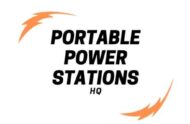In an increasingly mobile and unpredictable world, having reliable access to portable power solutions is critical, especially for those who depend on medical devices like CPAP machines. These devices are lifesaving for people managing sleep apnea and other respiratory conditions. For individuals with such medical needs, losing access to power—whether during travel, camping, or emergencies—is not an option.
In this comprehensive guide, we explore how portable power stations are the ultimate solution for powering medical devices like CPAP machines. We’ll discuss their benefits, key features to look for, and how they provide independence, safety, and peace of mind.
Why Portable Power Stations Matter for Medical Needs
Emergency Preparedness
Medical devices like CPAP machines, oxygen concentrators, or nebulizers are critical for maintaining health, and a power outage can disrupt their operation. Portable power stations ensure that these devices continue functioning during emergencies, offering a lifeline for individuals who depend on them.
On-the-Go Power
For frequent travelers or those who enjoy camping and RV adventures, portable power stations provide the convenience of using medical devices without relying on fixed power sources. This flexibility is particularly valuable for maintaining health routines while exploring remote areas.
Off-Grid Living
Many individuals are opting for off-grid lifestyles, but medical devices still require reliable power. Portable power stations integrated with solar charging options allow for an independent, self-sustaining power supply.
Benefits of Portable Power Stations for CPAP and Medical Devices
- Reliability: Provides consistent power during blackouts or emergencies.
- Portability: Compact and easy to transport, making them ideal for travel.
- Quiet Operation: Essential for overnight use with CPAP machines, ensuring restful sleep.
- Solar Compatibility: Many models offer solar charging options for extended off-grid usage.
- Backup Battery Storage: Ensures multiple uses before recharging, which is crucial during extended outages.
Key Features to Look for in a Portable Power Station for Medical Use
- Battery Capacity
Look for models with at least 300Wh for powering CPAP machines and smaller devices overnight. For longer use, opt for 500Wh or more. - Output Ports
Ensure the power station includes:- AC outlets for CPAP machines.
- USB-A and USB-C ports for charging phones and small gadgets.
- DC ports for specialized medical devices.
- Inverter Technology
Pure sine wave inverters are essential for sensitive medical equipment, ensuring stable and safe power delivery. - Battery Type
Lithium-ion and LiFePO4 (Lithium Iron Phosphate) batteries are the most common. LiFePO4 batteries offer a longer lifespan and more charge cycles, making them ideal for daily use. - Run Time
Calculate run time based on your device’s wattage. A 300Wh power station can run a 40W CPAP machine for approximately 6-7 hours. - Portability and Weight
Compact designs are easier to carry and store, especially for travel. - Noise Levels
Opt for stations with silent or low-noise operation for overnight comfort. - Recharge Speed
Fast recharge options, such as wall outlets, car adapters, and solar panels, ensure minimal downtime.
Recommended Use Cases for Portable Power Stations
1. At Home During Power Outages
A reliable power station ensures uninterrupted use of medical devices during blackouts. Larger capacity models with multiple AC outlets can also support other essential electronics.
2. While Traveling
Whether on road trips, flights, or international travel, portable power stations provide a compact solution for powering medical devices in hotel rooms or remote locations.
3. Outdoor Adventures
For campers and hikers who require medical devices like CPAP machines, portable power stations offer the freedom to explore off-grid while maintaining health and comfort.
4. Remote Healthcare
In remote areas or during natural disasters, portable power stations can power devices used by healthcare professionals, enabling basic medical care in challenging conditions.
Solar Integration: The Ultimate Off-Grid Solution
Pairing portable power stations with solar panels creates a sustainable power ecosystem. For CPAP users spending time off-grid, solar charging extends the functionality of their power station, ensuring uninterrupted energy supply without relying on traditional power sources.
Top Considerations for CPAP Users
Compatibility with CPAP Models
Some CPAP machines, like those with humidifiers or heated tubing, consume more power. Check the device’s wattage requirements and choose a power station with sufficient capacity.
Battery Backups and Extras
Invest in additional batteries or a solar panel kit for longer durations off-grid.
Ease of Use
Look for user-friendly displays and straightforward controls, particularly for older users.
Regulatory Compliance
Ensure the power station complies with air travel regulations if you plan to fly with your CPAP machine.
Additional Devices Supported by Portable Power Stations
Aside from CPAP machines, portable power stations can support:
- Nebulizers
- Oxygen concentrators
- Insulin refrigerators
- Blood pressure monitors
Recommended Portable Power Stations for Medical Use
While this article doesn’t include affiliate links, here are some top-performing brands and models renowned for their reliability in the medical niche:
- Jackery Explorer Series – Renowned for quiet operation and solar compatibility.
- EcoFlow River Series – Known for its fast recharging capabilities.
- Bluetti AC200P – Offers high capacity and versatile output options.
- Goal Zero Yeti Series – Features robust build quality and multiple charging methods.
- Anker PowerHouse Series – Compact and travel-friendly for medical devices.
Final Thoughts: Powering Health and Independence
For those relying on medical devices like CPAP machines, portable power stations are more than a convenience—they’re a necessity. By offering reliable, portable, and versatile power solutions, these devices empower users to maintain their health and independence, no matter where they are or what challenges arise.
As technology advances, the possibilities for portable power solutions will only grow, making them indispensable tools for modern living. Whether you’re at home, on the road, or off-grid, a portable power station ensures you’re always prepared, always connected, and always in control.
